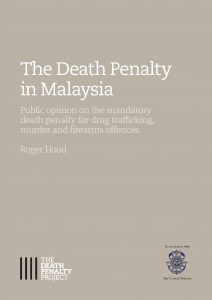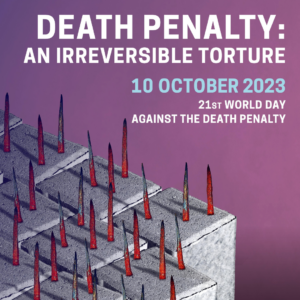
Malaysians Believe in Death Penalty, But Not Willing to Mete it out
- DPP in the Media
- 3 Dec 2013
Source: The Star, Malaysia online newspaper
KUALA LUMPUR: Malaysians believe in the death penalty but do not want to impose it – even on perpetrators of the most serious crimes.
This seemingly contradictory attitude was among the findings of a recent study by the Death Penalty Project (DPP) on the mandatory death sentence in Malaysia for murder, drug trafficking and Firearms Act (Increased Penalties) Act offences.
According to the public opinion survey, Malaysians prefer incarceration, either jail without parole, or an indeterminate life sentence with consideration of parole, or a determinate period of years.
The Malaysian Bar and Suhakam want the Government to abolish the mandatory death penalty or, in the interim, give judges the discretion to impose capital punishment.
Bar president Christopher Leong and Suhakam chairman Tan Sri Hasmy Agam are making this call again in light of the survey findings and the high number of recommendations the Government received on the matter from United Nations member states on Oct 24 during its Universal Periodic Review (UPR) at the Human Rights Council (HRC).
The Government has until March to tell HRC whether it will accept the recommendations.
As at June 2013, a total of 964 Malaysians have been sentenced to death for crimes for murder, terrorism-related offences, drug trafficking, robbery with firearms and firearms possession, kidnapping, and treason.
While the number of firearms offences are increasing, Malaysian Crime Prevention Foundation vice chairman Tan Sri Lee Lam Thye had noted in July that the death sentence had not deterred the drug trade.
According to the Federal Narcotics Department, 85,500 people, including foreigners, were arrested for drug-related offences in the first half of 2013 and the seized drugs were valued at RM48.11mil, almost double the amount for the same period last year.
Its statistics show more than 190 Malaysians were arrested overseas for being drug mules since 2011, some in countries like China and Indonesia which also impose the death penalty.
In July last year, Attorney-General Tan Sri Abdul Gani Patail said Malaysia might follow Singapore’s move to abolish the mandatory death penalty for drug couriers.
He said they were researching whether to give judges the discretion of imposing it and also to re-sentence those on death row to life sentences.
Because of the amendments in Singapore, Sabahan Yong Vui Kong escaped the gallows with life imprisonment and 15 strokes of the cane at a re-sentencing on Nov 14.
Leong said in an interview that the call from the international community at the UPR was supported by the door-to-door survey of 1,535 Malaysian citizens between Nov 8, 2012 and Dec 28.
“The findings, launched in July, show there would be little public opposition to the abolition of the mandatory death penalty for the three offences.
“A large majority favoured the death penalty, whether mandatory or discretionary – 91% for murder, 74-80% for drug trafficking depending on the drug, and 83% for firearms offences.
“But when presented with 12 ‘scenario’ cases, only 1.2 persons in 100 thought it was the appropriate punishment.”
Hasmy, who had attended Leong’s briefing for parliamentarians on Nov 14, said the findings showed Malaysians were not in favour of mandatory death sentences and preferred giving judges the discretion.
Leong said the Bar advocated the abolition of the death penalty on the belief that every individual has the inherent right to life as guaranteed under the Federal Constitution.
“Guilty persons ought to receive punishment but that is not the same as saying that they ought to die.
“The death penalty is a reflection of the notion that ‘an eye for an eye’ provides the best form of justice but this is a concept we should not embrace nor practise today, bearing in mind there is still no criminal justice system in place which is foolproof.”
As a result of the growing political and public debate here on whether the mandatory sentence should be abolished completely or retained and used only in the gravest of circumstances, Leong said, the DPP, a leading international human rights organisation, commissioned Prof Emeritus Roger Hood – an eminent criminologist from Oxford University – to design, analyse and report on the findings of the large-scale public opinion survey on the mandatory death penalty for the three said offences here.
The research was carried out by Ipsos Malaysia, a market research company.




















